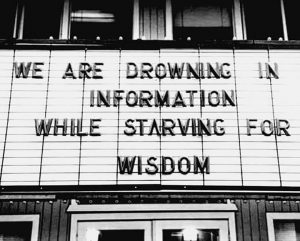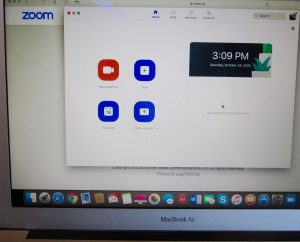When it comes to computer technology – the quotidian kind that most normal modern people welcome and embrace – I’ve always been late to the party. Or I’ve avoided the party altogether.
My resistance has stemmed from fairly understandable reasons, I think; among them: Staring at screens hurts my eyes, I refuse to be enslaved by a machine, and I believe I was born in the wrong century.
Even as a child, when television was new, watching it gave me headaches. I preferred to play outdoors than be glued to the TV screen in the living room, the way the other kids were. As it turned out, I’m very far-sighted; so it’s more comfortable for my eyes to look far into the distance – past the treetops, into the hills — than it is to try to focus on anything close.
Today, although I have specially prescribed computer glasses, I still get eye strain when I spend time in front of a screen. So I’m quick to close the lid on this laptop and go outside for a pleasant walk.
I remember a science professor in college pontificating (or was he prophesying?) about the future of computers. They would one day learn to replicate themselves — with mutations! — he stressed. They would take over the world, he claimed. Humans would be their slaves, he said.
“Oh, no!” I thought, as I sat in his enormous class. “Not I! I won’t let that happen to me!” And from that point on, I somehow, somewhere down deep, considered computers my adversaries. I didn’t want to live in a world where they ruled. I ran from them, running as far away as Africa.
As for my preferred century, I think I would choose the mid- to late-19th. During the years I was doing research for and writing my novel Jamie’s Muse, based on what little I knew about my great-grandmother, Helen Reid David Black (b. May 3, 1862, in Kirriemuir, Scotland; d. 1885(?) in Natal, South Africa), I felt at times that I was living then – during the Industrial Revolution. I was happy to be walking in Helen’s shoes and seeing life through her eyes as I strove to recreate the dramatic story of her short life. I felt at home there and then.

But here I am now, a misfit in the high-tech Information Age, in which computers, for good or ill, play an outsize role. Haltingly, I’m trying to make peace with them, trying to see their benefits, as if I were a visitor from another era.
This week, for example, my friend Be Scott in Taos, New Mexico, taught me how to do Zoom. (Yes, I’m really late to this party. Zoom Video Communications was founded in 2011.)
Since the coronavirus pandemic took hold last March, however, Zoom’s “cloud-based, peer-to-peer software platform” (I’m quoting Wikipedia), used for “teleconferencing, telecommuting, and distance education,” has taken off. And I find myself being slowly won over by this technological wonder. (If you’re new to Zoom too, please read Be’s “Zoom Guide for Beginners,” below.)
Imagine being able to SEE dozens and dozens of my WOW subscribers, friends and family, from all over the world, all in one place (on one screen!) when I do my December 6thZoom reading, sponsored by SOMOS (the Society of the Muse of the Southwest) in Taos!
No need to purchase airline tickets this time, as I did two years ago, to read for SOMOS in Taos. No need to risk catching the coronavirus. We can be together (well, virtually) again, face to face. What a thrilling thought!
For this event I’ll be reading short essays from my new “baby” book, Sweet Tarts for my Sweethearts (Nighthawk Press, Taos, NM), most of which I wrote while I was still living in Taos, before I came here to San Miguel de Allende, Mexico, to retire.
Time permitting, I’ll also give a brief demo on tart baking, explaining some of the special equipment and techniques involved. And, too, I’ll take questions from attendees at the end. We can have an almost-in-person, back-and-forth across the miles and oceans.
So please save the date:
Sunday, December 6that 4 pm US Mountain Time.
All are invited to attend, and it’s free of charge, of course. Closer to the date, I’ll be providing more information as needed. And maybe by that time I’ll be a pro at zooming! This is one computer party I don’t want any of us to miss. I’d love to see you there.
~ ~ ~ ~ ~
Zoom Guide for Beginners
by Be Scott
If you’ve never used Zoom before, you’ll need to download and run an app. Then you’ll have it in your system and shouldn’t have to download it again.
Here’s how to do it: In your browser, go to https://zoom.us/download. The first option is Zoom Client for Meetings. Click on the Download button.
The app will be downloaded into your Downloads folder. Open your folder and find a file with an open yellow box that says Zoom.pkg. Double click to open, and you will get the message “Welcome to the Zoom Installer.”
In the bottom right-hand corner of that window, click on Continue. Then click on Install for all users of this computer. Again click on Continue.
Another message will tell you how much space the app will take on your computer. Click on Install. It will show your name and ask for your system password. (That means the password you use to make significant changes to your computer.) Enter your password, and the app will automatically go to the next menu. Click on Close Application and Install.
At the end, it will ask you if you want to trash the installer. Click yes.
The next window to pop up should be a Zoom window with two options: Join a Meeting and Sign In. Click on Join a meeting and enter the Meeting ID. It will also ask for your name.
Might as well check the box next to Remember my name for future meetings. Below that, there are two more options: Don’t connect to audio and Turn off my video. Don’t click either of these unless you don’t want to be seen or heard.

